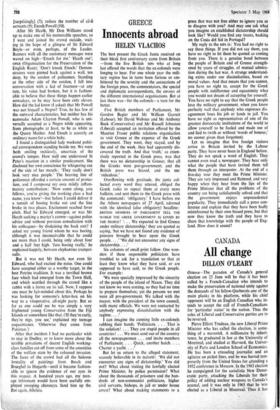Innocents abroad
GREECE HELEN VLACHOS
The best present the Greek Junta received on their bleak first anniversary came from Britain —from the five British MPS who at long last offered the words that the ex-colonels were longing to hear. For one whole year the mili- tary regime has in turns been furious or em- bittered by the severity and the accusations of the foreign press, the commentators, the special and diplomatic correspondents, the envoys of the different international organisations. But at last there was—for the colonels—a turn for the better.
Five British members of Parliament, Mr Gordon Bagier and Mr William Garrett (Labour), Mr David Webster and Mr Anthony Buck (Conservative) and Mr Russell Johnston (Liberal) accepted an invitation offered by the Maurice Fraser public relations organisation to visit Greece at the expense of the Greek government. They went, they stayed, and by the end of the week, they had apparently dis- covered the truth. And that `truth,' as exten- tively reported in the Greek press, was that there was no dictatorship in Greece; that all the Greeks were pro-government; and the British press was biased, and the BBC 'ridiculous.'
Overflowing with gratitude, the junta col- lected every word they uttered, obliged the Greek radio to repeat them at every news bulletin, and sent them to the Greek press with the command : `obligatory.' I have before me the Athens newspapers of 27 April, adorned with the identical (also obligatory) headline: BRITISH MEMBERS OF PARLIAMENT TELL THE WORLD THE GREEK GOVERNMENT IS LOVED BY 'THE PEOPLE! . . We expected to find Greece under military dictatorship,' they are quoted as saying, `but we have not found any evidence of pressure brought to bear upon the Greek people.. . ."We did not encounter any signs of dictatorship. . .
Six columns of small print follow. One won- ders if these responsible politicians have troubled to ask for a translation so that at least they know what they have said, or are supposed to have said, to the Greek people. For example : `We were specially impressed by the sincerity of the people of the island of Naxos. They did not know we were coming, so they had no time to prepare themselves; yet the persons we met were all pro-government. We talked with the mayor, with the president of the town council, with many officials. We were not contacted by anybody expressing dissatisfaction with the regun• e. . . .
I can imagine the cunning little ex-colonels rubbing their hands. `Politicians. . . . That is the solution! . . . They are stupid people in all countries! ... We must send out of the country all the newspapermen . . . and invite members of Parliament. . . . Quick, another batch. . . . Charter a yacht. . .
But let us return to the alleged statement, scarcely believable in its navetd: `We did not encounter any signs of dictatorship.' You did not? What about visiting the lawfully elected Prime Minister, by police permission? What about the thousands of prisoners and the hun- dreds of non-communist politicians, higher civil servants, bishops, in jail or under house arrest? What about making statements to a press that was not free either to ignore you or to disagree with you? And may one ask what you imagine an established dictatorship should look like? Would you find any traces, basking on the Costa del Sol in Portugal?
My reply to the MPS is: You had no right to say these things. If you did not say them, you have no right to let them be quoted as coming from you. There is a genuine bond between the people of Britain and of Greece strength- ened by years of struggles, of mutual admira- tion during the last war. A strange understand- ing exists under our dissimilarities, based on moral values. And that means that you cannot, you have no right to, accept for the Greek people with indifference and equanimity what you would not dream of accepting for yourself. You have no right to say that the Greek people love the military government, when you know perfectly well that anybody who expresses dis- agreement loses his job or lands in jail. You have no right as representatives of one of the greatest democratic institutions of the world to allow yourself to be fooled and made use of and lied to (with or without 'words of honour,' no sooner given than forgotten).
Let us imagine that five foreign visitors arrive in Britain invited by the Labour party. They have never been in England before. They do not speak a word of English. They cannot even read a newspaper. They hear only what the people that have invited them tell them through an interpreter. At the end of a five-day tour they meet the Prime Minister. They are very impressed and flattered, and very happy when they hear from the lips of the Prime Minister that all the problems of the country are being satisfactorily solved and that the government enjoys unprecedented popularity. They immediately call a press con- ference and explain that they have been badly misinformed by their own biased press, but that now they know the truth and they have to share that knowledge with the people of Eng- land. How does it sound?






































 Previous page
Previous page